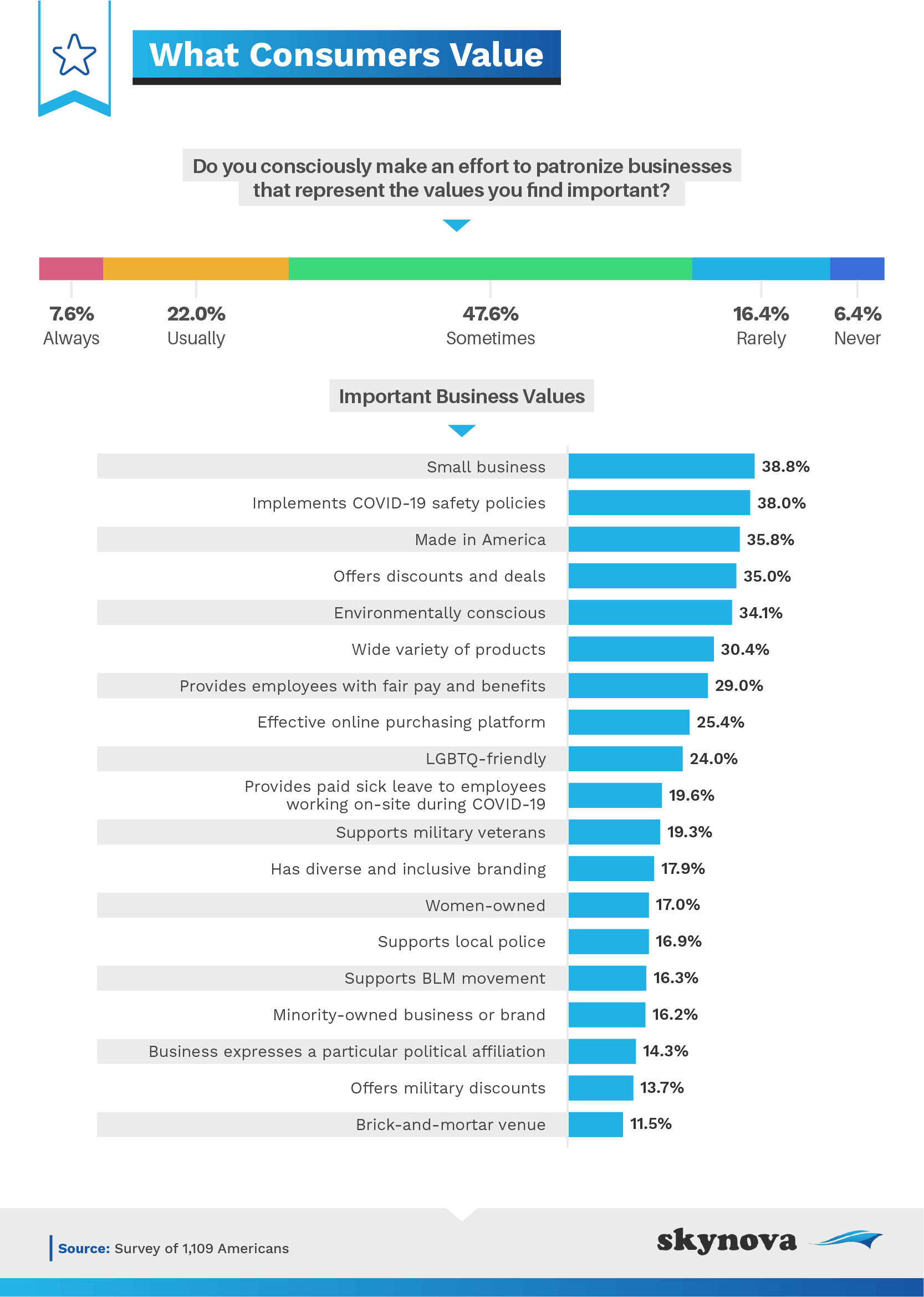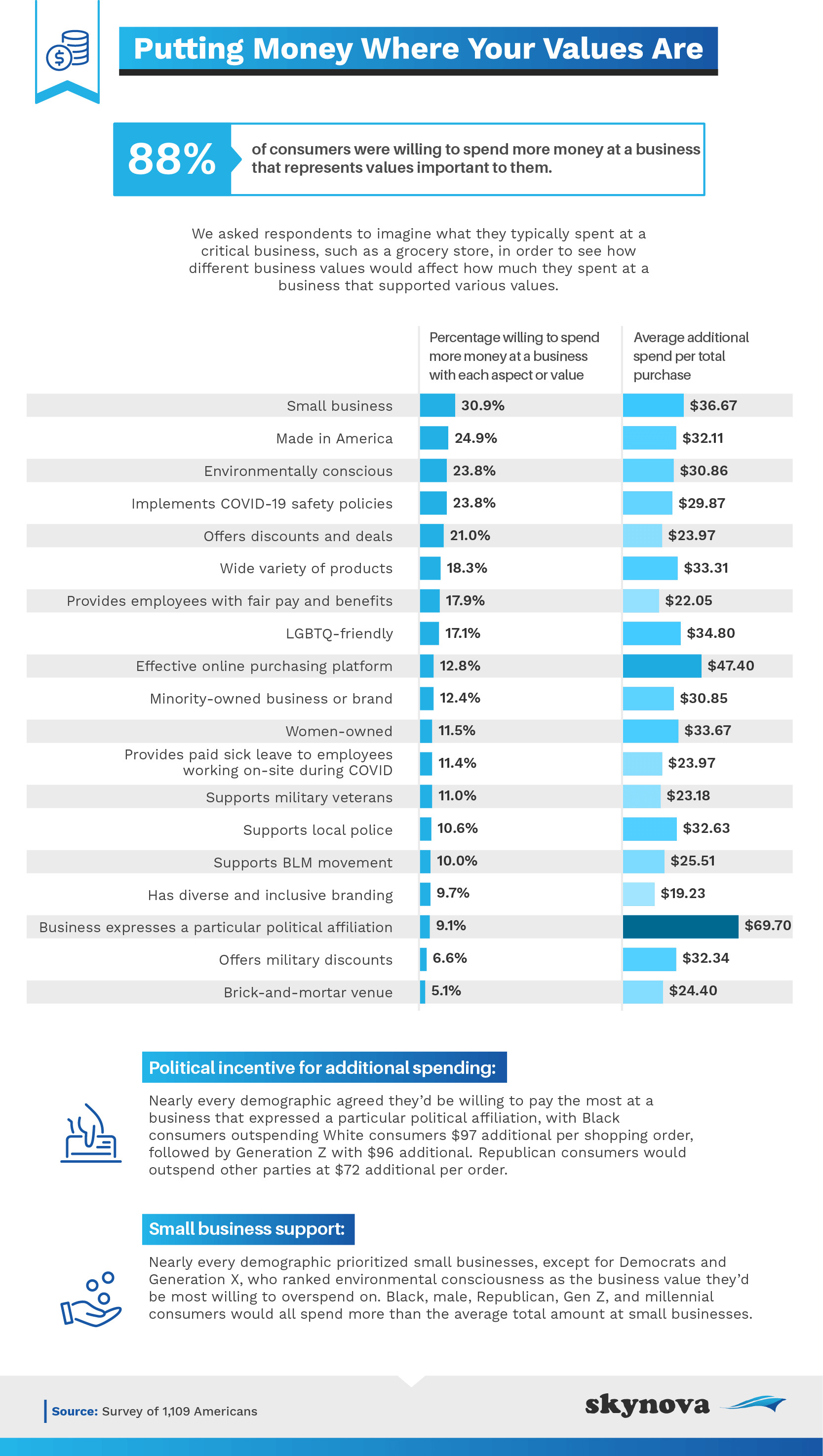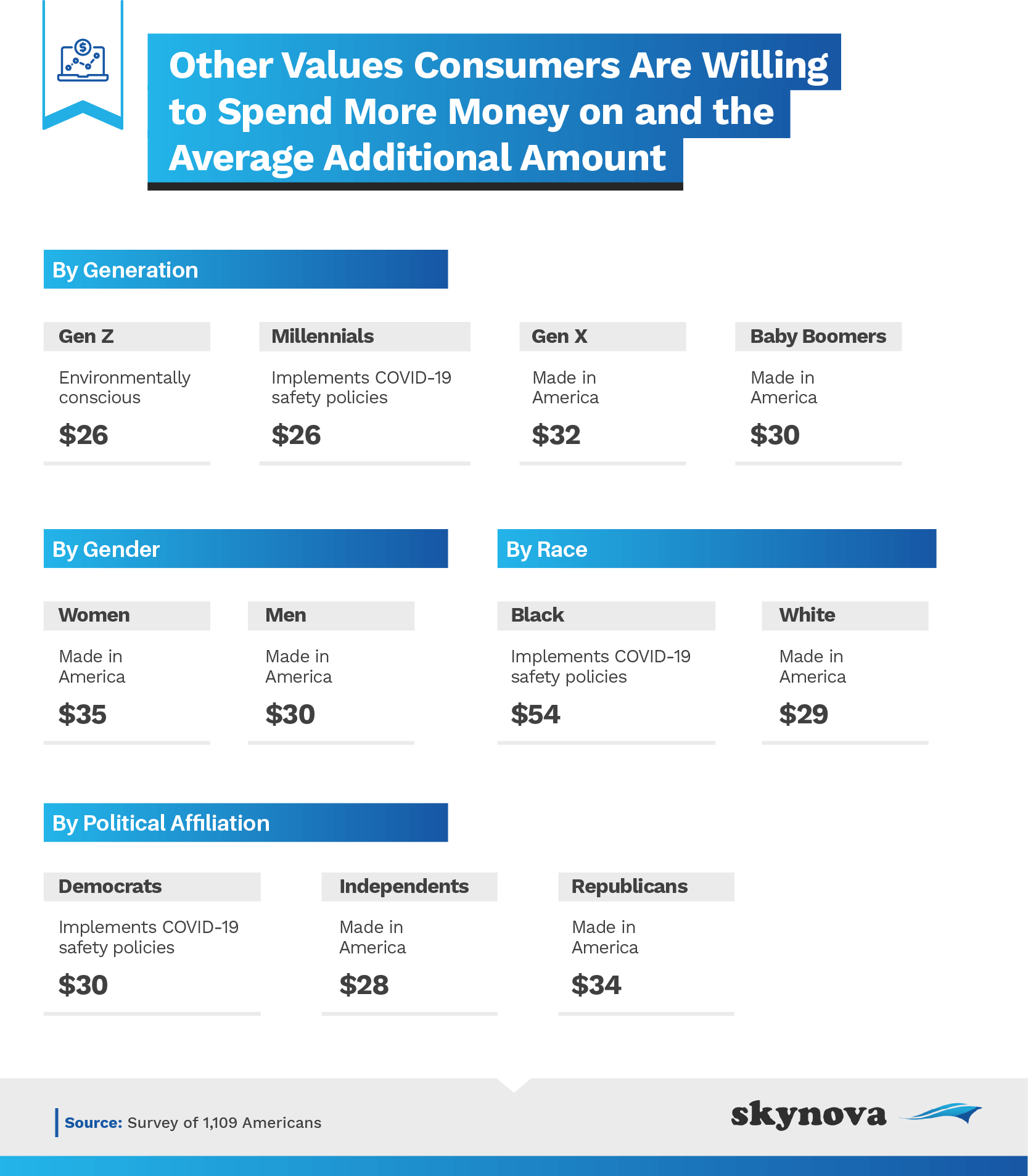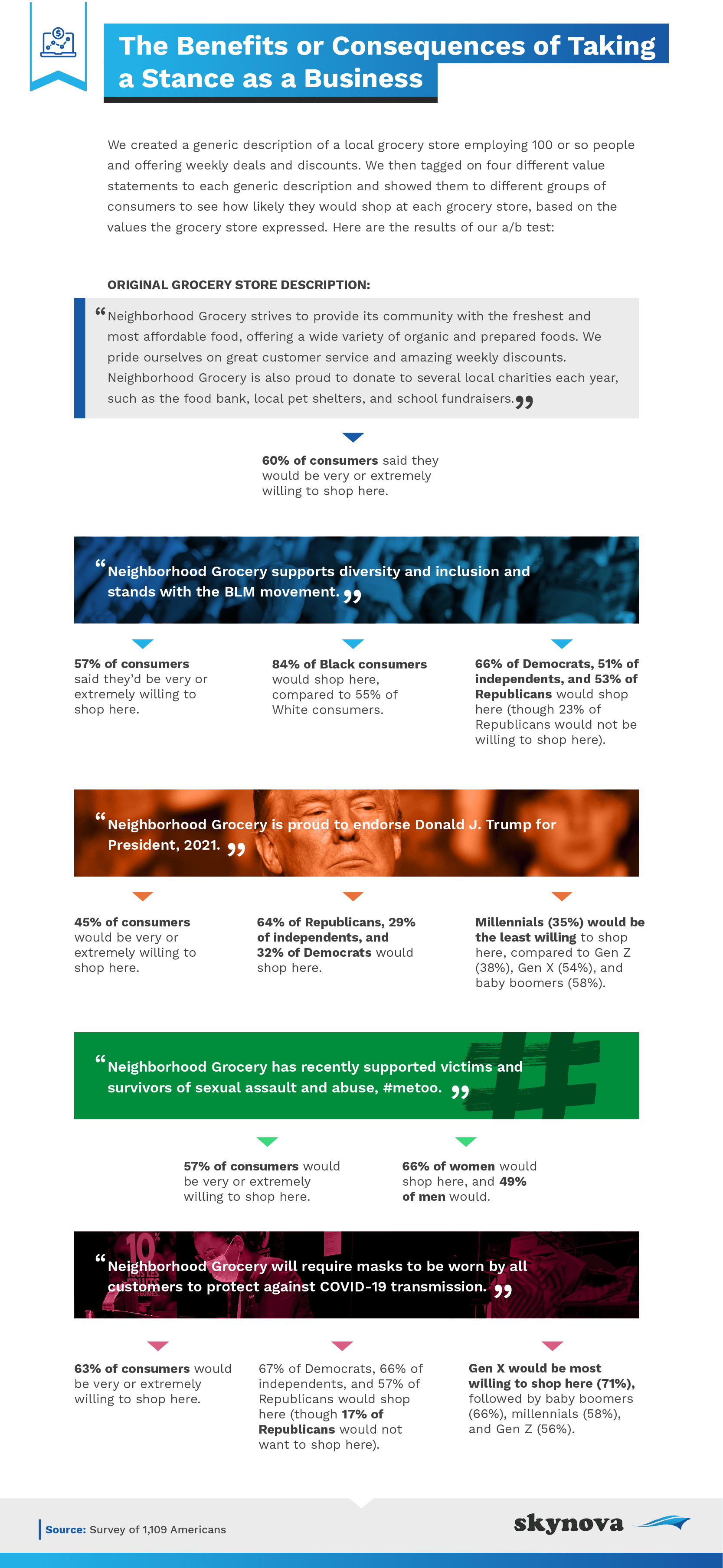
|
Politics may feel like something you can’t escape these days, including when you’re shopping. In recent years, the concept of conscious consumerism has taken flight, giving a name to the process of buying from (or boycotting) companies based on their social and political positions. If you don’t know where to start, but you like the idea of voting with your wallet, some simple research tips can help answer many of the questions you may have about a company and recommendations for being a conscious consumer on a budget.
But when the rubber meets the road, how much money are people willing to spend to shop with brands they can believe in, and which social issues influence spending? To find out, we surveyed over 1,100 people about which business values matter most to them, how often they think about those values before shopping, and how much extra money it can cost to become a conscious consumer. Read on to see what we uncovered from their responses.
When asked how often they make a conscious effort to spend money with businesses whose values align to their own, nearly 1 in 3 consumers said they made it a priority to spend their money at businesses that reflect their values. But the majority of consumers reported that they did this much less frequently than our more persistent conscious consumers. That doesn’t necessarily mean consumers lack the desire to spend more consciously. It’s important to note that it takes some time and research to figure out the business values of the companies and brands you shop with. In recent months, we become more tuned into brand values than ever, due to the urgency of recent events such as the COVID-19 outbreak, Black Lives Matter movement, and the economic hardships faced by small businesses due to the pandemic. The data below explores where consumers are allocating their spending, based on the values they support.

For Americans, two business values reigned as the most important: shopping with small businesses (39%) and shopping with companies that are implementing COVID-19 safety policies (38%). In 2020, these two values could not be more interlinked. At a time where many cities across the country are struggling to understand how to reopen their economies amid a global health crisis, it’s more evident than ever how vital small and local businesses are to the economy. Many small businesses are feeling financial strain as a result of the pandemic and may be relying on conscious consumerism to bring customers through their doors.
We also included more practical consumer values in the survey to see how opportunities to save money ranked with values like environmental consciousness and employee wellbeing. Even though consumers are making an effort to support businesses based on their values, financial wellbeing is one of the most important anchors of consumer attitude right now, especially with the uncertainty of the economy at this time.
Consumers expressed support for small businesses, businesses providing COVID-19 safety policies, offering products made in America and supporting environmental consciousness. But as our study shows, consumers may be a little less passionate when it comes to spending more money to support these values. Fortunately for small businesses, consumers were most willing to spend a little more on their products or services, around $37 more per total purchase. Our data below compares which business values had higher returns than others.

Using the grocery store, a common shopping experience for most consumers, as an example, we asked people to think about the amount of money they spent on a typical purchase. Then we asked consumers to indicate an amount they would be willing to spend additionally if that grocery store supported a particular value.
While just 9% of shoppers were willing to spend more to shop with a business or brand that expressed a particular political affiliation, they were willing to pay the most ($69.70), on average, to support it. Thirteen percent of shoppers were willing to spend more if a business had an effective online purchasing platform, averaging $47.40 more on their total purchase. At a time when social distancing continues to be a key consideration for many, online sales have seen remarkable growth in 2020.
Other values consumers surveyed were willing to spend major money on included shopping with small businesses ($36.67), LGBTQ+-friendly brands ($34.80), and companies with a wide variety of products ($33.31).

The social issues you’re willing to overspend on to shop with like-minded businesses may shift generationally. Younger generations were willing to spend less additional money, on average ($26), but Generation Z shoppers indicated their most crucial business value was shopping with environmentally conscious brands, while millennials were aware of businesses implementing COVID-19 safety policies. Among older Americans, the value of products made in America was worth the most to overspend, including $32 for Generation X shoppers and $30 for baby boomers.
While both men and women surveyed generally agreed that buying products made in America was worth spending extra, Caucasian shoppers agreed to the additional sum of $29, on average. At the same time, Black consumers indicated COVID-19 safety policies were worth more ($54). Those surveyed who identified as Democrats agreed COVID-19 safety policies were important enough to spend extra on ($30), while independent voters ($28) and Republicans ($34) gave added value to businesses selling products made in America.
To understand what issues matter to shoppers, we created five fictional brands with mission statements that embodied specific social and political values to understand whether shoppers would go out of their way to support them.

Without a doubt, the most universally appreciated business was a grocery store that clearly required masks to be worn by all customers while shopping, appealing to 63% of consumers, including 67% of Democrats and 57% of Republicans. The least popular business model was a local grocery store that endorsed Donald Trump for reelection, with just 45% of consumers being very or extremely willing to shop there.
Two other brands with an emphasis on supporting the Black Lives Matter movement and #MeToo (including victims and survivors of sexual assault) each earned 57% of shoppers attention – and money. As we found, 23% of shoppers who identified as Republicans would not be willing to shop with a grocery store that publicly supported Black Lives Matter.
In 2020, many people are making significant shifts in their spending habits due to COVID-19 and the health crisis in America. And as our study shows, though the political and social values companies are supporting makes an impact on consumer sentiment, health and financial security remain top concerns for consumers in 2020, reflected by the fact that COVID-19 safety policies and discounted prices and deals were the second and fourth most important business values, respectively.
The study also highlights a promising sentiment for small businesses: consumers are choosing to support smaller enterprises during these challenging times, and are often willing to spend a little more to do so.
Skynova helps small businesses stay organized and professional by offering online invoicing, accounting, receipt tracking and more. Skynova also produces in-depth studies of business-related topics so small business owners can find the resources they need for their business concerns or interests. Topics include studies on workplace strategies, technology, and employee wellbeing, featuring surveys, business datasets and statistics to help business owners gain essential perspectives and insights to navigate the constantly changing business landscape. Learn more about our online invoicing for small businesses at Skynova.com today.
We surveyed 1,109 Americans on their opinions of various American business values, and how they influenced their desire to spend money at those establishments. We also conducted an a/b test where we created a generic description of a grocery store as well as variations of that description with the addition of various value statements. Then, we showed these descriptions to different groups of survey participants, averaging around 183 respondents per business description. We followed up by asking how likely those respondents would shop there after reading the description and cross-analyzed those results by demographic variables like gender, race, and political affiliation. Survey participants ranged in age from 18 to 74 with an average age of 39 and standard deviation of 14 years. Sample sizes for demographic groups are as follows:
Survey data has certain limitations related to self-reporting. These limitations include telescoping, exaggeration and selective memory. We weighted our data for our a/b test result analysis in order to normalize sample sizes between political affiliations, races, genders, and generations.
Want to help local businesses understand what conscious consumerism can mean for their bottom line? Share the results of this study for any noncommercial use with the inclusion of a link back to this page as credit to our teams for their work on this report.